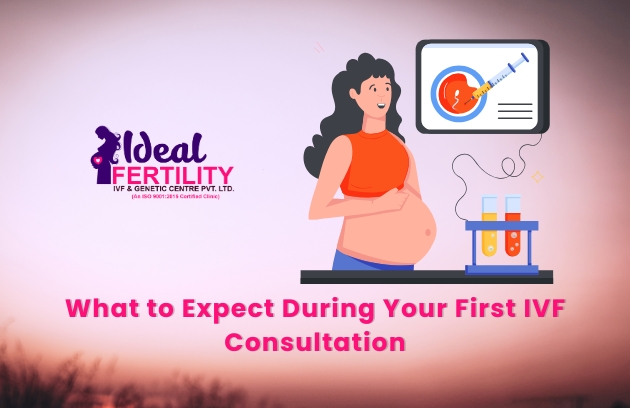Table of Contents
Starting your journey with In Vitro Fertilization (IVF) can be both exciting and overwhelming. Whether you’re exploring options at a center for IVF or searching for the best IVF clinic in India, the first consultation is a crucial step. It sets the stage for your treatment plan and helps answer all your questions about the process, IVF cost, and potential outcomes.
This article provides a detailed guide on what to expect during your first IVF consultation, covering key steps, essential preparations, and frequently asked questions.
Why Your First IVF Consultation Matters
Your initial meeting with a fertility specialist is more than just a routine appointment. It’s a comprehensive session to:
- Assess your medical history.
- Evaluate factors contributing to infertility.
- Discuss diagnostic tests and potential treatments.
- Outline estimated costs, such as IVF rates in India or the IVF package cost offered by your clinic.
By understanding the purpose of this session, you’ll feel more prepared and confident about your next steps.
Step-by-Step Guide to Your First IVF Consultation
1. Registration and Documentation
Your first interaction with the clinic typically involves completing registration forms and providing essential medical documents.
- What to Bring:
- Previous medical records.
- Test results, including hormone levels and ultrasounds.
- Any treatments or procedures you’ve undergone, such as IVF and ICSI attempts.
2. Medical History Discussion

The doctor will take a detailed account of your medical, surgical, and reproductive history.
- Key Areas Covered:
- Frequency and regularity of menstrual cycles.
- History of miscarriages or ectopic pregnancies.
- Lifestyle factors, including diet, stress, and habits like smoking.
For male partners, the doctor may ask about:
- History of surgeries or infections affecting reproductive health.
- Results from previous semen analyses.
3. Diagnostic Tests
Your fertility specialist will recommend diagnostic tests to identify potential issues. These tests may include:
- For Women:
- Blood tests to measure hormone levels (e.g., FSH, AMH, LH).
- Transvaginal ultrasound to assess ovarian reserve and uterine health.
- For Men:
- Semen analysis to evaluate sperm count, motility, and morphology.
In some cases, additional tests like hysteroscopy, laparoscopy, or genetic screening may be suggested.
4. Discussion of Treatment Options
Based on your medical history and test results, the specialist will recommend tailored treatment plans.
- Possible Options Include:
- Ovulation induction: For mild infertility cases.
- IUI (Intrauterine Insemination): A less invasive option before IVF.
- IVF Test Tube Process: Creating embryos in a lab for transfer to the uterus.
You’ll also discuss the timeline for the treatment, which typically involves 4-6 weeks for one IVF cycle.
5. IVF Cost Breakdown and Financial Planning
Your doctor or clinic coordinator will provide a clear explanation of costs, including transparency in pricing ensures that you’re prepared for the financial aspects of the journey.
6. Q&A Session
This is your opportunity to clarify doubts. Questions may include:
- What are the chances of success in your specific case?
- What are the risks and side effects of treatment?
- Are there payment plans or insurance options?
How to Prepare for Your IVF Consultation
- Do Your Research
Learn about the clinic’s reputation, success rates, and services. If you’re searching online, use terms like IVF center near me or IVF clinic near me to find the best options. - List Your Questions
Prepare a list of questions about treatment options, costs, and expected outcomes to make the most of your consultation. - Bring a Support System
Attending with your partner or a trusted family member can provide emotional support and ensure you don’t miss any key details.
What Happens After the First IVF Consultation?
- Diagnostic Testing:
After the initial consultation, you’ll undergo the recommended tests. - Treatment Planning:
Once test results are available, the fertility specialist will finalize your personalized treatment plan. - Pre-Treatment Counseling:
Most clinics offer counseling sessions to prepare you emotionally and physically for the treatment journey.
Why Choose India for IVF Treatments?
India has become a preferred destination for IVF due to its combination of advanced technology, skilled doctors, and cost-effectiveness.
Key Advantages:
- Affordable IVF rates in India compared to countries like the US or UK.
- Presence of world-class clinics like the best IVF centre in Delhi or best IVF centre in Bangalore.
- Access to state-of-the-art facilities for treatments like IVF and ICSI.
Searching for best IVF near me in India often leads to clinics offering exceptional care and high success rates.
Conclusion
The first IVF consultation is a crucial step in your fertility journey, offering valuable insights into treatment options, costs, and potential outcomes. By understanding what to expect and preparing in advance, you can approach this experience with confidence and hope.
India’s reputation for affordable and high-quality fertility care ensures access to the best IVF doctors, state-of-the-art facilities, and transparent pricing, making it an ideal choice for couples worldwide. Whether you’re searching for the best IVF centre in India or exploring IVF cost options, your consultation is the beginning of a journey toward achieving your dream of parenthood.
FAQs About Your First IVF Consultation
Q1. How long does the first IVF consultation last?
Typically, it takes 1-2 hours, depending on the complexity of your medical history and the number of questions you have.
Q2. What tests are done during the initial IVF consultation?
Blood tests for hormone levels, ultrasound scans, and semen analysis for male partners are common initial tests.
Q3. How do I choose the best IVF clinic?
Research clinics based on success rates, patient reviews, and technology. Use terms like best IVF clinic in India to find top-rated options.
Q4. Are IVF costs in India affordable?
Yes, IVF cost in India is significantly lower than in Western countries, making it a cost-effective option without compromising on quality.
Q5. Is the first IVF consultation stressful?
It’s natural to feel nervous, but the consultation is an opportunity to gain clarity and take the first step toward parenthood.
Q6. Can I undergo IVF if I’ve had unsuccessful IUI attempts?
Yes, many couples move to IVF after multiple failed IUI cycles, as it offers higher success rates.
Q7. What happens if tests reveal a significant fertility issue?
Your doctor will discuss alternative options, such as donor programs or advanced treatments like genetic testing or egg freezing.
Q8. Is genetic testing necessary for all IVF cycles?
No, it’s only recommended for cases with a history of genetic disorders or recurrent miscarriages.


